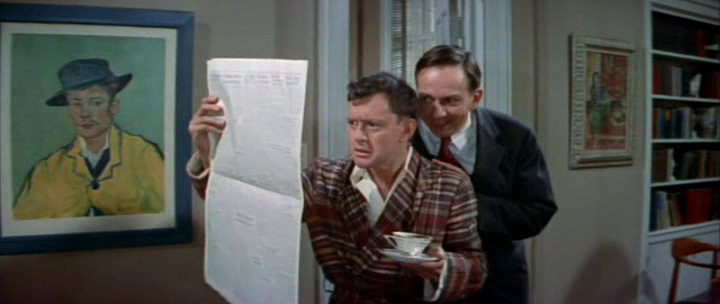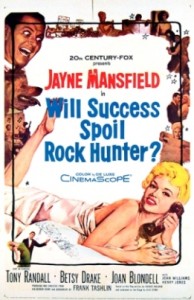|
Genres, Themes, Actors, and Directors:
- Advertising
- Frank Tashlin Films
- Jayne Mansfield Films
- Joan Blondell Films
- Play Adaptations
- Satires and Spoofs
- Social Climbers
- Tony Randall Films
Review:
Frank Tashlin’s follow-up to The Girl Can’t Help It was this loose adaptation of a stage play by George Axelrod (shifting the storyline to a satire of television advertising but retaining its leading lady). As Peary notes in his review of TGCHI, the satirical theme of both TGCHI and WSSRH? is that “‘success’ [ironically] has nothing to do with leading a personally meaningful life” — though, fortunately, this doesn’t stop the characters in either film from trying for both. In WSSRH?, Randall’s desperation to keep his job leads him to compromise his steady relationship with Betsy Drake for the sake of an elaborate publicity stunt (which boosts his career opportunities enormously). Meanwhile, Mansfield’s ploy to use Randall to make her beefcake boyfriend (Mickey Hartigay, Mansfield’s real-life husband) jealous works extraordinarily well — but she eventually realizes that the true love in her life is one George Schmidlap (appearing in a bizarre cameo at the end). Add Drake’s forlorn attempts to bustify her slim figure (the “lasting” effects of which garner a couple of genuine chuckles), and the admission by Mansfield’s assistant (Joan Blondell, compelling as always) that she’s still pining for her long-lost milkman lover, and the entire film is essentially a tableaux of characters derailed — temporarily or otherwise — from “true” romantic happiness.
Unfortunately, while Tashlin is reasonably effective (as always) at skewering various obsessions of the ’50s (busty blondes, corporate success), the film as a whole isn’t entirely successful. Mansfield’s Rita Marlowe is far less sympathetic than her Jerri Jordan in TGCHI, coming across here as much more of a “pure” caricature — and her shrill imitation of Marilyn Monroe’s squeal quickly gets on one’s nerves. Meanwhile, the film’s denouement is a bit of a disappointment; it appears that Tashlin doesn’t quite know where to take his narrative or his characters. Nonetheless, given that this film was “selected for preservation in the United States National Film Registry by the Library of Congress as being ‘culturally, historically, or aesthetically significant'”, all film fanatics will surely be curious to check it out at least once.
Redeeming Qualities and Moments:
- Tony Randall as Rockwell Hunter

- Joan Blondell as Violet

- Betsy Drake as Jenny

Must See?
Yes, simply for its historical relevance as one of Tashlin’s best-known films. Listed as a Cult Movie in the back of Peary’s book.
Categories
- Historically Relevant
- Important Director
Links:
|




One thought on “Will Success Spoil Rock Hunter? (1957)”
Not a must, and I say that with regret. I really want to like this film but, as a follow-up to Tashlin’s sublime ‘The Girl Can’t Help It’, it simply fails on too many counts. You’re not going to be outright bored. But you may very well feel something’s definitely missing.
Bottom line: it simply tries…too…hard. There’s a certain effortlessness in the spirit of ‘TGCHI’; ‘Rock Hunter’, on the other hand, feels labored. The two films are equally stunning visually, each parading Tashlin’s signature, cartoon-color style. But ‘The Girl…’ flies by; ‘Rock…’ runs out of steam as it continues to shamelessly milk and hammer home its one-note script.
That’s the root of the problem: the script. It really needs more jokes. Some genuine ones are heard – and Tashlin certainly makes a point of beefing up the visual humor as well – but…well, watch ‘The Girl…’ and ‘Rock…’ back-to-back, and the difference in verbal wit will soon be apparent. (‘The Girl…’ also had the zippy element of all of that rock ‘n’ roll.)
Oddly, some of the best bits are given to the supporting players, who do a fine job with them and tend to steal the film: i.e., Blondell (esp. with her terrific monologue about when she really fell in love), Drake (who exhibits some wonderful comic timing), and John Williams as the advertising exec who longs to be a horticulturist (and eventually, happily, becomes one).
Fave bit: midway, Randall stops the film’s action (by way of an intermission) to talk to the audience directly – and to help audiences more comfortable with tv and radio feel more welcome. Tashlin rises to the occasion here as he tosses some real zingers about the drawbacks of early television. Very funny bit.